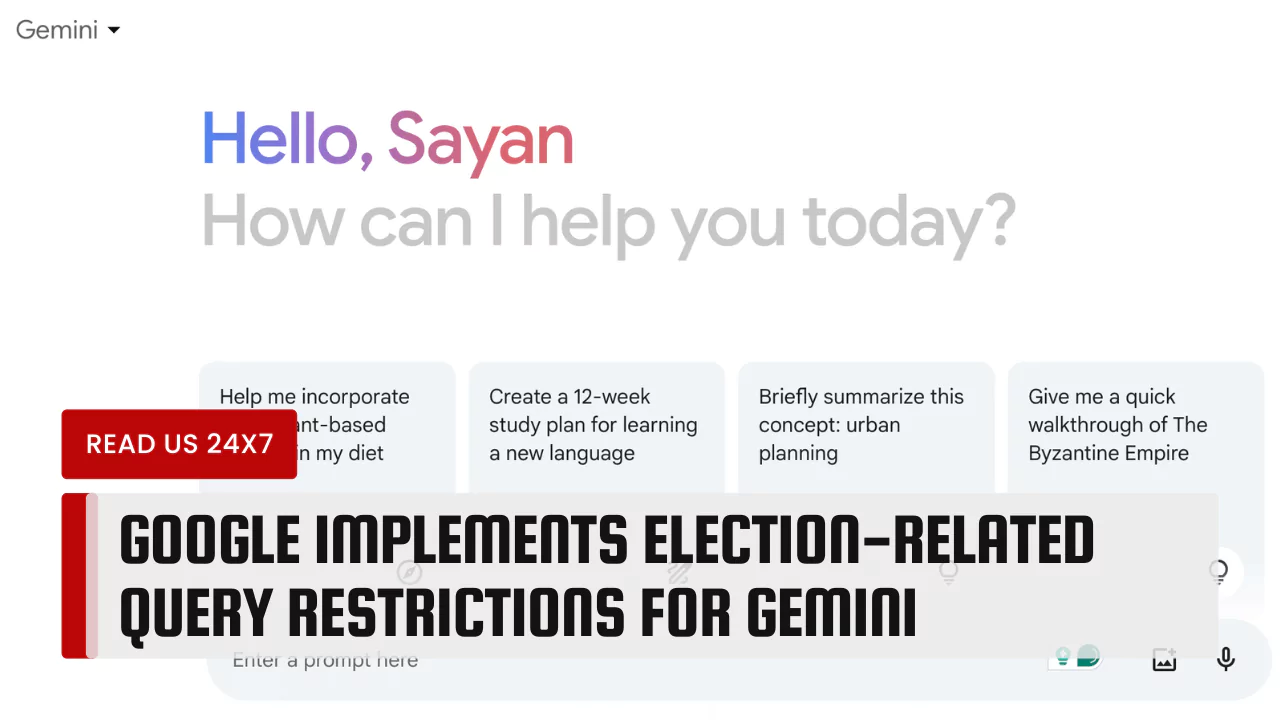Google has recently taken a significant step in its efforts to combat misinformation surrounding global elections. The tech giant has announced restrictions on its AI chatbot, Gemini, preventing it from answering queries related to upcoming elections worldwide.
Google Limits Gemini AI’s Ability to Answer Election-Related Queries
The decision to restrict Gemini’s responses comes amidst growing concerns about the potential spread of misinformation through AI technology. With advancements in generative AI, including image and video generation, there has been a heightened risk of false information being disseminated. In response, Google is implementing measures to avoid any potential missteps in the deployment of this technology.
Restrictions in Multiple Countries
These restrictions are not limited to a single country. With elections scheduled in various nations, Google aims to ensure that Gemini does not inadvertently contribute to the dissemination of false or misleading information. This proactive approach underscores Google’s commitment to maintaining the integrity of the electoral process globally.
Preventing Misinformation
By limiting Gemini’s ability to respond to election-related queries, Google seeks to prevent the spread of misinformation. Inaccurate or biased responses from AI chatbots can potentially influence public opinion and undermine the democratic process. Therefore, Google’s decision to restrict Gemini’s responses is aimed at safeguarding the credibility of election-related information.
Suspension of Image-Generation Feature
Google’s AI products, including Gemini, have come under scrutiny following inaccuracies in historical depictions of people generated by the chatbot. As a result, Google has temporarily suspended Gemini’s image-generation feature. This move reflects the company’s commitment to addressing issues of bias and inaccuracies in AI-generated content.
Efforts by Google and Other Tech Companies to Combat Election Misinformation
Google is not alone in its efforts to combat election misinformation. Other tech companies, including Facebook, are also taking proactive measures to address this issue.
Facebook’s Measures
Meta Platforms, the parent company of Facebook, has announced the creation of a dedicated team tasked with tackling disinformation and abuse of generative AI. This team will work to identify and mitigate the spread of false information, particularly in the lead-up to significant electoral events.
Creation of Team at Meta Platforms
The establishment of this team underscores Meta Platforms’ commitment to combating misinformation on its platform. By leveraging AI and human expertise, Meta Platforms aims to enhance the integrity of its services and protect users from the harmful effects of misinformation.
Other Restrictions on Chatbot Gemini
In addition to election-related queries, Google has imposed other limitations on Gemini’s responses.
Limiting Answers on Citizenship Laws
Gemini is also restricted from providing responses to queries related to citizenship laws in certain countries. This limitation is intended to prevent the dissemination of inaccurate or outdated information regarding citizenship requirements and eligibility criteria.
Restrictions on Certain Countries
Furthermore, Gemini’s responses may be restricted in specific countries where there are concerns about the potential impact of misinformation. By imposing these restrictions, Google aims to mitigate the risk of false or misleading information being propagated through its AI chatbot.
In conclusion, Google’s decision to implement election-related query restrictions for Gemini reflects its commitment to combating misinformation and safeguarding the integrity of the electoral process. By imposing limitations on Gemini’s responses and suspending its image-generation feature, Google aims to prevent the spread of false information while promoting transparency and accuracy in online discourse.


